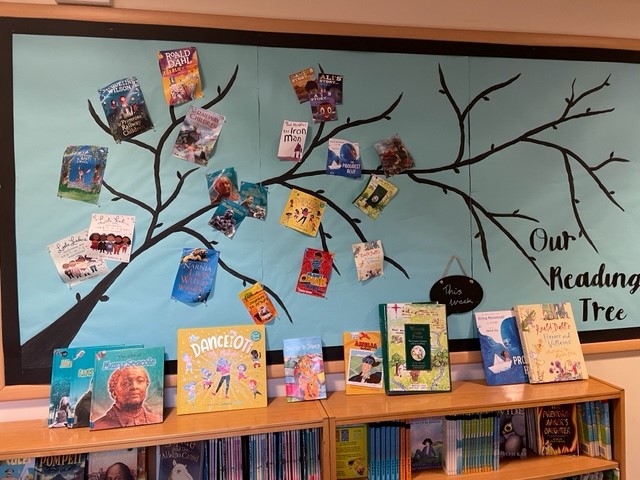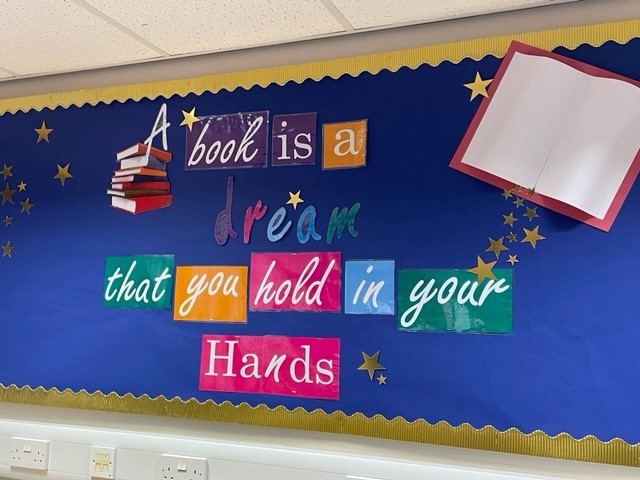KS1 Christmas challenge winner
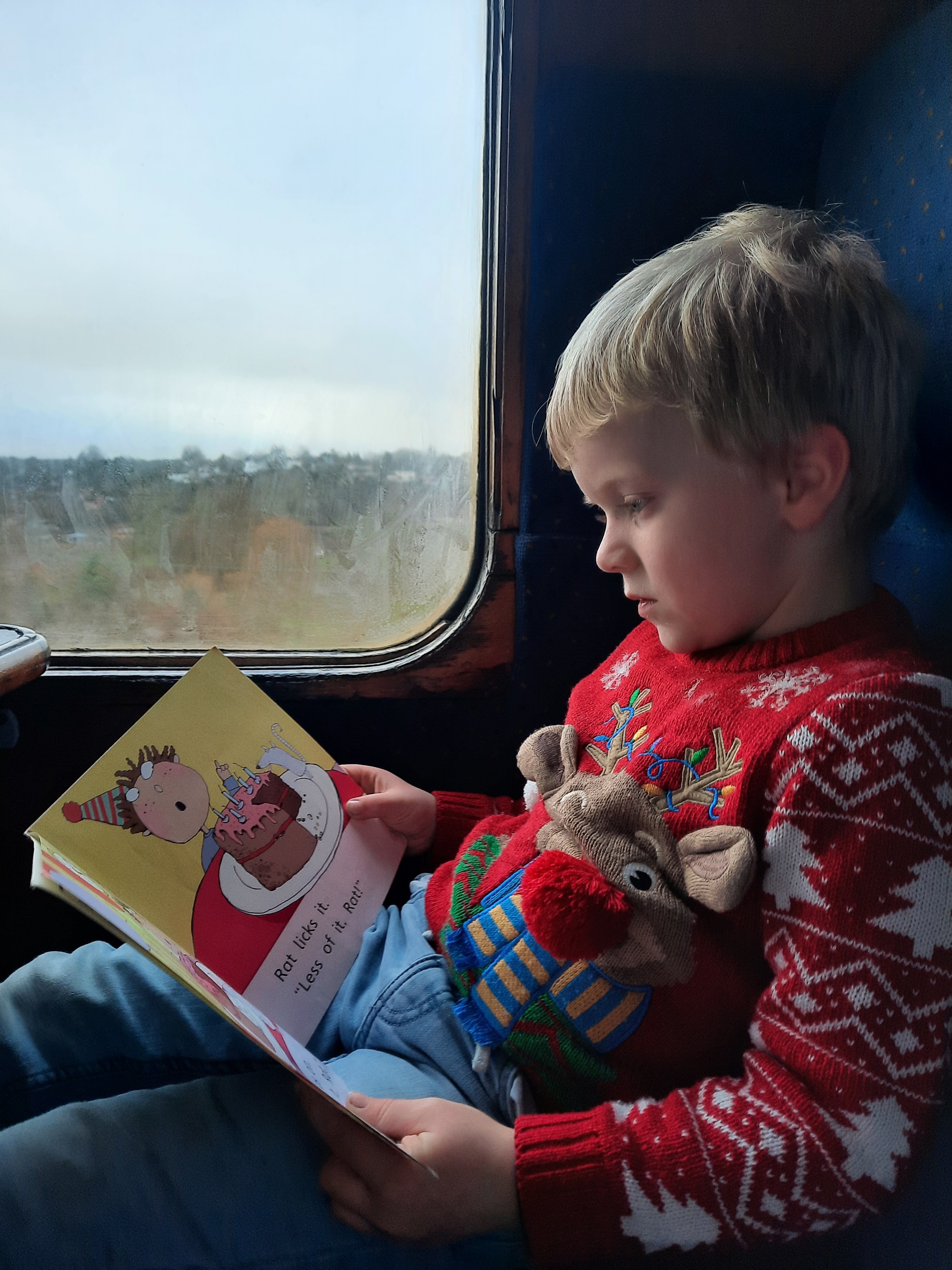
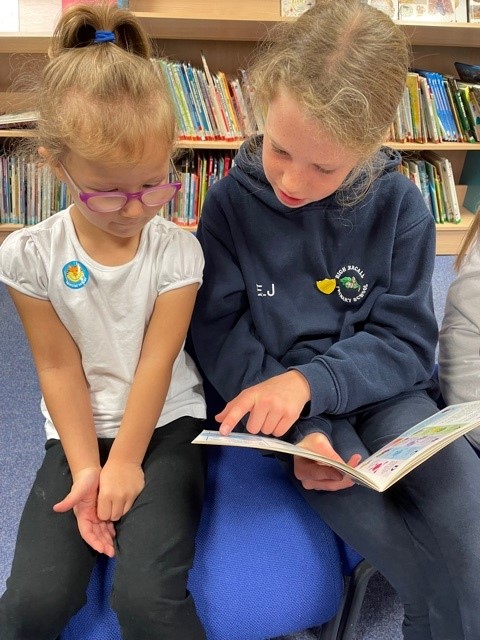
Our school librarians reading with younger children
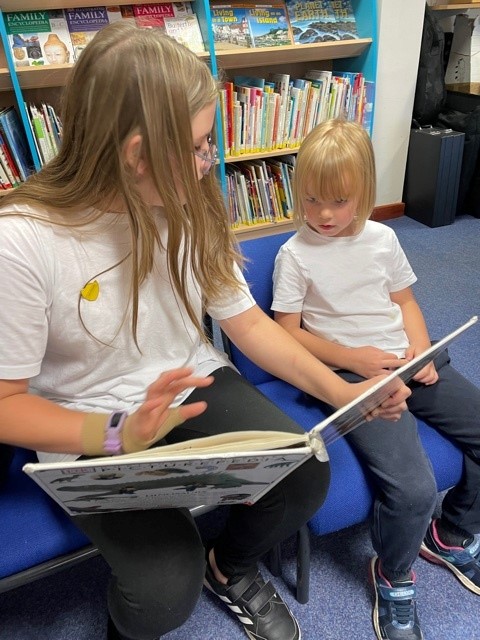
School librarians enjoying a book with a younger child.

KS2 Christmas challenge winner
At High Ercall Primary School we love reading! We value reading for enjoyment enormously, and we encourage all our children to read regularly at home and school. We want all our children to find books they enjoy, challenge themselves to read different genres, to find new authors and to read for different reasons. We want all our children to learn to read, and read to learn.
Intent
What does reading look like at High Ercall?
At High Ercall Primary school, we want all our children to become proficient and fluent readers. We encourage and support all children to have knowledge of and read a variety of genres and authors. This will enable them to become skilled and fluent readers, who can use and understand a wide range of vocabulary in their spoken and written language.
The intent of our reading curriculum is to:
- enable our children to build on and acquire new substantive knowledge - progressing quickly with phonics and word reading to be able to read with fluency and automaticity
- give our children opportunities to read and be read to from a broad range of texts - to build breadth and depth of vocabulary knowledge and knowledge of literary features.
- Make links across the curriculum, with carefully selected texts which build both vocabulary and contextual knowledge.
- build strategies to enable our children to comprehend their reading and respond critically to it in writing by explaining, summarising, inferring, predicting
- Promote and enable our children to read widely, read more, recommend readers to each other and talk about texts with confidence and enthusiasm.
- follow the National Curriculum expectations for each year group
- deliver a curriculum accessible to all to enable children to know more and remember more, building upon their starting points
- recognise that literature also plays a key role in supporting the children’s development – culturally, emotionally, socially and spiritually
Our curriculum has been built to include our key curriculum drivers:
- our school values, the 5Rs
- the role of active learning
- building our children’s understanding of diversity.
In our curriculum we have also considered the journey of a child through the school, so that our curriculum is progressive even when a child remains in a class for 2 years. Each class has a two year rolling programme so that no learning is repeated.
What do we want children to be able to do by the end of Year 6?
We follow the National Curriculum expectations for reading and expect that our pupils will have met or exceeded the expected standards for Year 6 pupils. Our reading targets extend to expectations in Year 7, both nationally and for our local feeder schools, to support transition into secondary school.
Our children consistently achieve above the national expectations in the SAT tests by the end of Year 6.
As the children start school in Reception, the reading curriculum focuses on phonics and word reading to enable the children to become fluent by progressing quickly with segmenting and blending sounds and recognising unfamiliar or tricky words. Phonics is taught systematically through from Reception, and up into Key Stage 2.There are clear expectations of the knowledge to be taught, which is set out in the Phonics Bug curriculum for each year group. We want to support all our children to become fluent.
Once fluent, children are able to build comprehension, and progression is set out clearly for each year group. The expectation by Year 6 is that our children can write and respond to a text critically including summarising and explaining literary features or authorial intent.
We also want our children to read more and learn more from their reading, read recommended books and in turn recommend texts to others. Our children take the lead from staff who recommend books, read widely to their classes and promote the 'habit' of reading.
How will this support the children in lifelong learning?
It is essential that by the end of their time at High Ercall in Year 6, our pupils can read fluently, and with confidence to use these skills in any subject in their secondary education. It is also essential for us that our children have developed a habit of reading widely, for pleasure as well as information, and through this have acquired a wide vocabulary they can apply to all subjects – including writing and spoken language.
Implementation (see also English policy)
How is the curriculum for reading organised and how do we teach it?
All children read and are read to daily. Children in EYFS and KS1 access phonics taught daily. The children in all classes will hear quality texts, they will read as a group, as a class, individually or with a peer. They read for pleasure, or for information within other subjects using library books.
At High Ercall, there is a clear school long-term plan for whole class reading, including class texts for each term, and other texts including poetry and non-fiction books. These are read daily with the children for enjoyment and discussion. This long term plan is reviewed annually to ensure there is a clear progression of vocabulary and texts, but also to take into account new texts published and content relevant across the curriculum. The context of texts are considered so that the background knowledge that children have acquired in another subject will support deeper understanding of a text.
Phonics (see also the Teaching Phonics page on the website) is taught daily in EYFS and KS1 using a systematic scheme created by Pearson Phonics Bug. The children are taught as a group in a 20 minute session each day. There is clear structured phonics planning in place, from our scheme, Phonics Bug, for all staff to follow and use for ongoing assessment. Within each taught session there is explicit teaching which links reading phonemes and decoding within words, and writing the same phonemes within words and sentences. Early reading and writing are intrinsically linked.
Some children also have additional 'keep up' sessions in the afternoon to boost progress if needed. This includes the use of Precision Teaching - a tool that all have have had training in to target specific aspects of phonics to enable rapid progress.
Group reading is also taught daily. Children in EYFS and KS1 read daily within their phonics lessons. They read a text which matches taught phonics to ensure development of substantive knowledge and practise of taught phonemes. Children sit in pairs after a phonics lesson and use their 'sound talk' to segment and blend taught phonemes from the lesson. Staff move around the room and listen to children, modelling and supporting fluency. Some children will also read individually to teaching and support staff, to give additional support and opportunity to improve fluency. Matched books are also sent home and sent online on Phonics Bug.
Whole class reading: Children in Key stage 2 are taught reading daily as a whole class – with a focus on developing a range of strategies to support comprehension knowledge and vocabulary skills, through VIPERS. VIPERS is an acronym for: Vocabulary, Inference, Prediction, Explain, Retrieve and Summarise. These strategies are planned and taught progressively to match the expectations of the National Curriculum. As part of our inclusive teaching and learning at High Ercall - all children access this high quality teaching, and support is used in class or outside of the reading lessons to help pupils who may need additional teaching including phonics.
Individual reading: Across school, some children will read additionally to adults on a 1:1 basis. This will build fluency, automaticity and confidence in applying substantive knowledge. For some children this will be word reading, and applying phonics knowledge, for others it will be using and applying taught aspects of comprehension. It is important at High Ercall that children who are still developing fluency and automaticity are given additional reading teaching on a 1:1 basis, to support phonological development, as well as accessing the high quality teaching and learning in reading with their peers in the classroom.
Storytime: Reading aloud to each class is important at High Ercall. The classes all enjoy a time when their teacher will read aloud each day. Assemblies are also times when stories are read, enjoyed and shared, and these books are available for the children to revisit and select for themselves from the hall.
During each week, children in KS2 will have time for DERIC (Drop Everything Read in Class). They may read individually, or to a partner, or read and recommend books to each other.
Reading Schemes:
At High Ercall we use the following phonics and reading schemes:
• Pearson – Phonics Bug
• Project X for our more confident readers who are reading phase 6 and beyond.
All children in Reception and Key Stage 1 read texts which are matched to the teaching in phonics. In this way they can practise their word reading skills and apply the taught knowledge from their phonics lessons in both class reading and individual reading at home and school. Books are sent home each week to read which also match taught phonics. It is important that children read and re-read books in order that they become fluent and confident in their reading. To supplement books purchased, children are also allocated online books which match the phonemes taught.
Phonics bug is also an online resource. Each child in Key Stage 1, and some in Key Stage 2, will have the username and password in their reading diary. For further information on this resource, look on the 'Phonics' page. Books are allocated online which match the taught phonics. A parent workshop is held annually - and the associated PowerPoint is on the phonics page.
Once children are confident with their word decoding, and have successfully completed phase 6 in phonics, children choose individual readers which are colour coded based upon vocabulary and levels of difficulty, but also organised in genre. This enables the children to choose texts which match their word reading ability - but also supports their wider disciplinary knowledge of genre and the features of different text types.
Children with SEND
Our children with any additional needs access the same high quality teaching and learning in reading as their peers. Our curriculum is fully inclusive. They may also be supported through an Individual Provision Map with additional 1:1 reading or specific phonics teaching through a programme called 'Precision Teaching' or specific teaching in a small group about an aspect of reading comprehension.
Where necessary an adapted curriculum is fully planned to take into account individual needs within the high quality whole class teaching. In reading, this could mean that a child:
- continues to be taught phonics into Key Stage 2 - fluency and phonological knowledge is a priority for all children
- has a pre-teach reading session to support with vocabulary
- has extra time to process reading comprehension questions
- has TA support to articulate ideas and record responses
- uses phonics resources around the classroom to support decoding
This is monitored by our SENDCO - Sarah Roberts - and parents are fully engaged and involved.
Impact
All of our staff, senior leaders and Governors are involved in measuring the impact of our reading curriculum in differing ways. This is planned through the School Development Plan, using our annual monitoring cycle and termly development plan to map out monitoring and review over the year.
Sarah Roberts, is our English Subject Leader. There is a clear monitoring cycle in place which evaluates reading teaching and learning, outcomes, pupil and parent voice. These outcomes feed into action planning to continually evaluate and improve our teaching and learning in reading.
Recent external monitoring has found that:
"Children read widely and with enthusiasm. They are self-motivated learners who want to read often and widely because of the enthusiasm and positive role models provided by all adults.
The children consistently access high quality texts, which make meaningful cross curricular links, and adults model well and exemplify vocabulary well.
Staff are well deployed to meet the needs to children with SEND and children who need extra reading support.
The classrooms and school environment are bright and attractive, developing a deep and real love of reading.
The children have an impressive knowledge of authors and genre of books.
Quality whole class texts are well chosen to widen horizons, develop understanding of diversity and make meaningful links."
Our Standard Assessment Test (SAT) data shows that:
- Children in EYFS, Year 2 and Year 6 achieve above national expectations.
- Our children in Year 6 achieve well above national expectations, with 100% achieving age related expectations and 55% achieving 'Greater Depth' in the tests.
How do we review and assess learning in reading?
Reading in our school is progressive and planned to meet the needs of all children. Assessments are carried out regularly to ensure children are accessing books of the right level and are being challenged in their reading. Assessments inform our teaching, they tell us and the children what they might need to do next, and they give us an overall picture of progress and attainment. Different assessments help us in different ways.
Here are some examples:
- Asking questions of the children within lessons
- Talking to the children about their reading and their written response to reading
- Hearing children read
- Regular informal phonics assessments
- Reviewing pupil reading diaries
- Phonics screening results – Year 1 pupils
- Summative assessments each year through a test called PIRA
- End of Key stage SATs results
We review our teaching and learning in reading by;
- Lesson observations and feedback to teaching staff
- Talking to the children about their reading - what they enjoy, what they read, their progress over time
- Professional development for all staff
- Parental response to school initiatives such as World Book day
- Parent feedback
- Governor involvement through line of enquiry - which could involve talking to children, staff and subject leaders about reading
